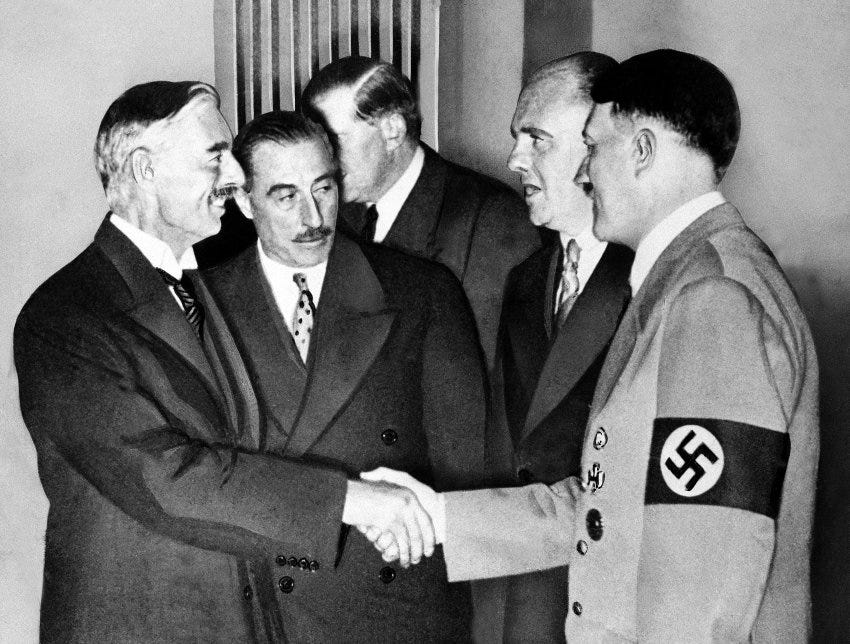Parallels have been drawn between appeasing rather than deterring Hitler in the 1930s and the present failure of the West to crush Putin. I won’t draw those here but rather just present some thoughts and musings on what happened all those years ago.
The discussions of this topic usually bring up two what ifs. What if the League of Nations (preferably with the U.S. joining) had become an effective provider of collective security through serious sanctions and even military action if necessary? What if Britain and France had stood up to Hitler at various critical moments during the 1930s?
Italy's invasion of Abyssinia in 1934 was one opportunity for the League to show its impotence by applying trivial sanctions. British public opinion was appalled by Mussolini's use of gas and poisoning of wells. However the government thought that crossing Mussolini would just drive him closer to Hitler.
I don't know whether Hitler's breach of the Locarno Treaty by remilitarizing the Rhineland in March 1936 was a matter for the League. His occupation of the Sudetenland on October 1 1938 certainly was, but given that Britain, France, Hungary and Poland were complicit in the whole business the League was not going to be much help for the Czechs. The occupation of the rest of Czechoslovakia in March 1939 was another opportunity for the League to show that it was a waste of office space.
There was a widely held view that Hitler could be appeased at least right up till the complete absorption of Czechoslovakia in March 1939. People convinced themselves that he just wanted to unite all Germans under one roof. This was fostered by the press and the BBC that suppressed any other view and dismissed it as irresponsible war mongering. What Hitler wrote in Mein Kampf about his intentions was not taken seriously. This was no doubt made easier by the fact that Hitler as copyright owner would not allow translations of the book and when one came out in America it was heavily abridged and sanitized.
Another sign of a marauding agenda was the state of the German economy which actually required the extensive occupation and plunder of other countries. It was highly dependent on the import of certain natural resources and its foreign exchange reserves were close to exhausted. They were in a real financial mess. Their only asset was their newly built military power and it had to start earning dividends.
Everybody dreaded war after the experience of WWI. The resulting pacificism was in full flight just when Hitler came on the scene to spoil the message that disarmament was the solution to war and that Germany had been badly treated at Versailles. Also people had a highly exaggerated picture of what German bombing could do.
Increased expenditure on arms was quite unpopular because of the economic difficulties caused by the depression and the pacifist view that rearming would increase the possibility of war by provoking one's adversary.
There was considerable sympathy for the Nazis in conservative circles as a bastion against Bolshevism. In particular, a lot of aristocrats became quite friendly. This was encouraged by the fact that the Nazis courted them in the mistaken belief that princes, dukes and earls still had political influence in Britain.
The British and French could have put their foot down when Hitler on March 16, 1935 embarked on open rearmament and the introduction of conscription. They could have reacted when he sent troops into the demilitarized left bank of the Rhineland a year later. Or they could have backed up Czechoslovakia. France and the Soviet Union already had a defense pact with that country. On all these occasions the French and British would have been in a better relative military position than they would be after Germany's huge arms expansion in 1939.
Counter-factual discussions seem to rely heavily on the idea that military action would have lead to the overthrow of Hitler. He would have been discredited and the Wehrmacht would have intervened. I haven't delved into these claims so can't form a view on the subject. Although, what I do know is that Hitler gave all generals large regular secret payments. Also, I suspect that removing the fascists, revanchist toxin would ultimately have required inflicting a full military defeat rather than simply a bloody nose. Achieving that task requires a united and mobilized people which in turn may require waiting until there was absolutely no choice.
Britain and France eventually declared war on September 1, 1939 after Hitler invaded Poland. One cannot help wondering what they would have done if they thought that Hitler was about to attack the Soviet Union next. Getting that country to take on all or most of the burden of dealing with Hitler was always their hoped for best outcome. However, this was ruled out by the fact that Hitler had just signed a neutrality pact with that country and looked forward to receiving lots of badly needed raw materials from that source.
Here are some good questions to ask. To what extent was it inherently difficult to see where things were heading? It is easy for us to see with hindsight. And what part was played both by self-deception and by insufficient animosity towards fascism?
This has been a very cursory and limited look at 1930s appeasement. There is a mountain of material out there on that period both academic and for the general reader. YouTube is also dotted with stuff.
A book called Appeasing Hitler by Tim Bouverie came out a few years back and has received some attention. I haven't read the book but have seen various interviews and presentations by the author. They include this talk he gave at the London Library




